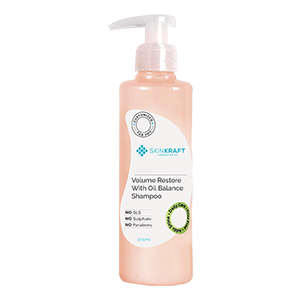Have you often considered parting ways with all your gorgeous black outfits, thanks to dandruff flakes? Every time somebody from the salon attends to your hair, or a friend notices your flaky scalp, do you find yourself explaining that you’re unable to get rid of your dandruff despite all efforts?
If all your dandruff-curing trials have gone in vain, it is probably because you haven’t yet understood what exactly causes it and what you should avoid in your hair care routine. So, we are here for your rescue. Scroll down to explore various treatment and prevention techniques.
Highlights:
Understanding Dandruff
Dandruff refers to the tiny white flakes on your scalp that usually fall on your shoulders as well. Those white flakes are nothing but dead skin cells. Scalps with dandruff may feel itchy, dry and red at times.
If you thought dandruff is always a result of bad hair care, you may be wrong. It could be a result of dry weather conditions, hair colors or other hair care products that may react with your scalp and cause flakes. Skipping hair washes while you have dandruff can aggravate the condition due to build up of dead skin cells.
It can also be caused due to fungus breeding on the oil or sebum on the scalp [1]. Dandruff can be at its peaks during winter months and can also be triggered under stress or fatigue.
Is Oil Bad For Dandruff?
While some people with dandruff avoid oiling their hair entirely, others do the opposite. The oil in your hair is known to attract more dirt and get mixed with the existing dandruff to cause itchiness. But not oiling the hair can leave your scalp dry.
The idea is to find a middleground, according to hair care experts. Oil your hair once every week and wash off with a gentle shampoo after a few minutes. Do not step outside with oil in your hair as it can attract all the dust. Oiling your hair helps boost blood circulation to the scalp and nourishes your hair strands[2]. It also keeps your scalp moisturized as dandruff prone scalp is usually very dry.
However, oils alone cannot combat dandruff. Some oils contain ingredients that can help fight the fungus which causes dandruff. So it is important to find an oil that can be effective against your dandruff.
What Is The Best Anti-Dandruff Hair Oil?
An ideal anti-dandruff hair oil should
- Balance oil or sebum [3] production on the scalp
- Maintain balance of the scalp pH [4]
- Have a moisturizing and cooling effect on the scalp
- Contain antimicrobial ingredients to fight dandruff
Look for oils that are light textured, non-sticky and chemical-free. Natural ingredients work well for dandruff.
A combination of coconut, eucalyptus, lemon oil, sunflower and almond oil helps in fighting dandruff and nourishing the scalp. Another good combination is mustard, sesame and tea tree oil [5]. Likewise, a combination of argan oil and apricot oil also helps in treating dandruff over time.
How to Apply Anti-Dandruff Hair Oil?
- Take a few drops of oil in your palms.
- Massage the oil into your scalp with your fingertips.
- For the best results, leave it on for three hours to overnight.
- Wash with a mild shampoo.
Note:
Your hair does not need as much oil as your scalp does. Do not over oil your hair as you will end up using more shampoo to get rid of it. And, more shampoo can cause further dryness.
What Not To Do After Oiling?
- Avoid combing your hair right after oiling as it is prone to breakage.
- Your scalp is relaxed after you’ve oiled your hair. Tight hairstyles are a big no after oiling as it can cause breakage.
- Avoid layering it with other hair products. You don't want to infuse chemicals into your hair right after oiling.
- Stay away from heat styling immediately after. Let your scalp and hair reap the benefits of oiling for a bit.
What To Check Before Buying Anti-Dandruff Oils?
Rosemary, neem, camphor, fenugreek and tea tree oil extracts are antimicrobial in nature. Look for pure oils and not the ones that may contain additives. Unrefined extra virgin olive oil can work well for dandruff. Ingredients like vitamin E can have a calming effect on the scalp.
Avoid Butylated hydroxyanisole, a common ingredient in coconut oils. It is a carcinogen [6]. Also, avoid fragrances in oils as they can worsen the scalp condition by causing irritation.
When To See A Doctor?
If you have been using anti-dandruff hair oils and shampoos for a while only to get disheartened by the results, it’s time to make a visit to the dermatologist. You can also check with your doctor if
- Your scalp is red or inflamed [7].
- You have terrible hair loss (losing 50-100 strands a day is normal).
- You have a red rash on other parts of your body.
Wrapping Up
Dandruff is neither contagious nor harmful. But it is a cosmetic issue for most of us. So understanding the right cause of your dandruff and using a mix of herbal oils can help fight it. You must also avoid chemicals to avoid the dandruff issue from getting worse. We hope you find a remedy in all the above mentioned anti-dandruff ingredients. Do visit your doctor if none of the solutions work for you.
1. https://www.ncbi.nlm.nih.gov/pmc/articles/PMC2887514/
2. https://www.ncbi.nlm.nih.gov/pubmed/12715094
3. https://www.ncbi.nlm.nih.gov/pmc/articles/PMC2835893/
4. https://www.ncbi.nlm.nih.gov/pmc/articles/PMC4158629/
5. https://medlineplus.gov/dandruffcradlecapandotherscalpconditions.html
Recommended Products
Was this Article helpful?
- Least helpful
- Most helpful





